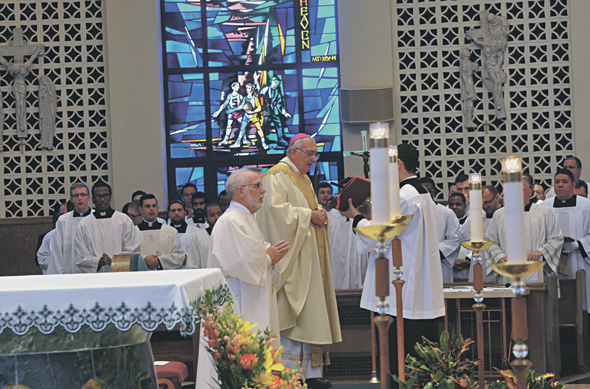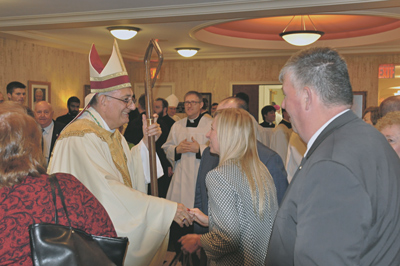
My dear brothers and sisters in the Lord,
This is the text of the homily preached by Bishop DiMarzio as he celebrated a Mass of thanksgiving Oct. 30 marking the 20th anniversary of his episcopal ordination.
First, I thank you for your presence today as I celebrate 20 years of Episcopal ministry. As I reflect back on these past 20 years, it was certainly a surprise to be asked to accept the episcopacy. When the nuncio of that time, now Cardinal Agostino Cacciavillan, called me and began speaking in Italian and said, “Chiedere niente e rifiutare niente,” which I later realized were the words of Saint Frances deSales, “Ask for nothing and refuse nothing.” Truly, the then-Archbishop Cacciavillan meant that he wanted me to answer yes. Well, I did answer yes, not knowing what lay before me.
Our second reading today was the reading I used in 1970 at my first Mass as a priest. Jesus was a high priest taken from among men. In fact, I had my sister, Donna, who was in high school at that time, make a banner where those words were displayed, “A Man Among Men.”
A priest is taken from among men to serve as their representative before God. Truly, the episcopacy accents this work of a priest. One always remains a priest. The work of the episcopacy is always the work of the priesthood. Sometimes the isolation of the episcopacy can be a burden in itself. The separation from family, friends and priest friends is sometimes difficult, especially if one is serving in a diocese other than one’s home diocese.
And yet, the great joy of the episcopacy is what I wish to share with you today. I have said this before, I have studied the two directories for bishops giving us guidelines on how bishops should act. One suggestion that is perhaps most telling is that the “bishop should be father, brother and friend to his priests.” Last year, I believe that I was able to straighten out that puzzle which is a rather difficult one to solve. How can a bishop exercise all those roles for priests? Yes, the bishop can be father to younger priests, brother to his contemporaries and friend to those older than himself. In my episcopal ministry, I have endeavored to do my best. Yet, there is never complete satisfaction of the exercise of this apostolic ministry in the Church.
Most recently, our Holy Father, Pope Francis, addressed new bishops at the most recent “Bishop’s School.” I never went to “Bishop’s School,” as they did not have it when I was ordained. During the most recent school, the Holy Father gave a talk entitled, “Pastoral Mercy.” I presume in this Year of Mercy Pope Francis wanted to emphasize this aspect of episcopal ministry. He said some interesting things, and I am trying to judge myself from what he said. He began by telling the bishops of “The thrill of having been loved first,” just as the Apostles and disciples recognized. But that this ‘thrill’ was also at the same time a burden, a burden of which he said, “Let yourselves be ‘destabilized’; this is good for a bishop.”
Well, I do think that destabilization is part of episcopal ministry. As soon as one thinks you have it all in order, something new happens. Every day here in the Diocese in Brooklyn and Queens some new problem has presented itself over these 13 years of my episcopal ministry. These years have never been boring, but they have been challenging.
The Holy Father mentioned to the new bishops his favorite scene in the Gospel, the call of Matthew, where his own pontifical motto is from “Miserando atque eligendo.” Jesus had mercy on Matthew and He chose him. Certainly, I have felt that same mercy of God in choosing me with certain talents, but also with certain shortcomings to follow Him and to guide the Church in, as the Holy Father says, “The task of rendering pastoral mercy.”

Pastoral Mercy, Pope Francis teaches us, is something that “puts a limit to evil,” quoting his predecessor Benedict. Mercy puts a limit to evil, because when mercy is not exercised, evil seems to take over. Once in a while, a priest will tell me, “in spite of all your faults Bishop, you have always been very good to those of us in trouble.” Well, I hope that this is true, as I have endeavored to do that because those most in need of mercy are those who are most troubled. Without mercy, the evil that they experience – whether it be personal or external – will never be put to an end.
Later in his talk, the Holy Father made three recommendations so that a bishop might render pastoral mercy. First, he said that bishops should be “capable of enchanting and attracting.” Well, that sounds something like what a magician would do. Hopefully, I have been able to attract my priests through leadership, through putting out into the deep as I continually say, stretching it a bit, trying to look to the past at what has not worked, trying to replicate what has worked, and understanding what is necessary for the future.
Regarding the work of formation, the Holy Father goes on to say, “Today, too much fruit is asked of trees that have not been sufficiently cultivated.” How true this is! He then goes on to say, “Think of the educational emergency, of the transmission of contents and values, think of the affective illiteracy, of vocational itineraries.”
I am sure that the work of initiating those in the faith, whether they be the laity or those pursuing priestly or religious vocations, is more complex today than ever. It is a world where the culture does not support those who wish to give themselves completely to the service of the Lord.
Pope Francis goes on to say that the solution of this problem is left to the bishop to “cultivate intimacy with God, source of the possession and delivery of Himself, of the freedom to go out and to return.” Only by being a man of prayer, which I try to be, can we ever attract and form others in the work of the priesthood.
Mercy does cure. Mercy does bring about miracles. Pope Francis also reminded the new bishops to “be bishops with a heart wounded by His mercy and, therefore, tireless in the humble task of accompanying the man that ‘perchance’ God has put in your way.”
The icon of the Good Samaritan, the image of the Year of Mercy, reminds us that most of all bishops must be the ones who accompany the wounded along the way, placing the wounded on our shoulders and taking them to those places of rehabilitation that can help them return to the service of the Lord.
And finally today, I wish to leave you with this proposal that will mark the next three years of my episcopacy here in Brooklyn and Queens. This is the recruitment of young men to the priesthood for the Diocese of Brooklyn.
When my mother was still alive and living in the Camden Diocese, I took her to the first priestly ordination I performed there. After the ordination, we were alone going home in the car and she turned to me and said, “Now I know what bishops are supposed to do. Make other priests.”
I have never forgotten her words. Whatever the Holy Father says is one thing, but what my mother said truly has remained with me since that time. One of the most important roles of a bishop is his mission to bring new priests to birth to serve the Church.
The vocation apostolate has been a top priority for me during these past 20 years. I have bothered and badgered you to help bring young men to our Project Andrew dinners. We have established the House of Discernment in the Diocese of Brooklyn which has been rather successful. We have a full-time vocation director and assistant vocation directors.
But surely without the assistance of all of our priests, the job of recruitment will never be successful for the future of the priesthood. I ask you in a special way to give me this gift. My secretary, Joanne, is always telling me, “I am being asked what you need as a gift…what do you need?” Most times I never really answer her, as truly I do not need anything. What I do need to fulfill my Episcopal ministry here among you in Brooklyn and Queens is to fill the ranks of those preparing for the priesthood for our diocese. We have been fortunate for the last several years with the number of men ordained to the priesthood, but as we look down the road to the future, we truly are in need of more vocations.
Recently, I received a letter from one of your brothers and mine asking me to declare a “Year for Vocations,” as the Year of Mercy ends. I hope to act on that request. If you wish to contribute to my episcopal ministry – if you wish to make me happy, if I have endeavored to make you happy – please give more effort, the best effort that you can, to the identification and recruitment of young men to the priesthood and religious life for Brooklyn and Queens. Only in this way can we fulfill what we heard in the first reading, that the Spirit of the Lord must come upon young people to continue the work of the Messiah, to bring Good News to the poor, to comfort those who mourn and to be anointed with the oil of gladness in ordination.

Dios lo guarde